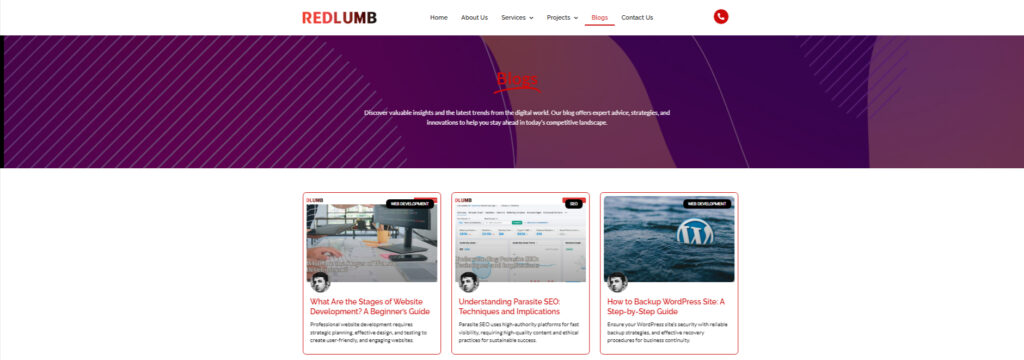Content writing serves as the backbone of effective communication in the digital age. Different types of content cater to diverse purposes and audiences, from driving traffic to influencing decision-making. Here is an in-depth look at the major types of content writing and their unique contributions to businesses and audiences.
Blog writing is one of the most versatile forms of content. It can educate, entertain, or engage readers by addressing topics that resonate with specific audiences. Blogs often serve as an entry point for users searching for information online, making them a cornerstone of search engine optimization strategies. Blog content is usually structured to be easy to read and digest, incorporating headings, subheadings, and visuals to maintain reader interest. The tone is often conversational to create a sense of connection. Blogs are instrumental in establishing a brand’s authority and fostering a loyal audience base. Copywriting is focused on persuasion and is widely used in advertising and marketing materials. Unlike blogs, which prioritize education or entertainment, copywriting is designed to prompt immediate action. It is commonly seen in website landing pages, advertisements, and email campaigns. Effective copywriting combines creativity with psychology, appealing to the emotions and desires of the target audience. The language is concise and direct, often incorporating a call to action to inspire the reader to make a purchase, sign up for a newsletter, or explore a product. Strong copywriting can be a game-changer for brands looking to convert potential leads into loyal customers. Technical writing specializes in breaking down complex concepts into simple, understandable language. It is essential in industries such as technology, engineering, healthcare, and finance, where clear instructions or explanations are required. Technical writers create manuals, user guides, software documentation, and white papers. Their primary focus is on accuracy, clarity, and functionality. This type of writing requires a deep understanding of the subject matter and the ability to anticipate the reader’s needs. By making complex information accessible, technical writing enhances user experiences and builds trust in a brand’s expertise. Social media content writing is all about creating short, impactful messages that engage audiences across platforms like Instagram, Twitter, LinkedIn, and Facebook. The primary goal is to spark conversations, build brand awareness, and foster community engagement. Social media content must be tailored to the specific platform, audience, and trends. It often incorporates hashtags, visual elements, and trending topics to maximize visibility. The tone can vary widely, from playful and casual to professional and authoritative, depending on the brand identity and audience expectations. Successful social media content not only entertains but also aligns with business objectives, such as driving traffic or promoting products. Creative writing focuses on storytelling, imagination, and emotional resonance. It is commonly associated with novels, poetry, and screenplays but also plays a role in marketing through brand stories, advertising campaigns, and content marketing strategies. SEO content writing is designed to improve a website’s ranking on search engines. It involves creating content that aligns with search engine algorithms while providing value to readers. Keyword research, strategic placement, and high-quality writing are central to successful SEO content. This type of writing encompasses blogs, product descriptions, website content, and articles. The challenge lies in balancing keyword optimization with natural, engaging language. Well-executed SEO content drives organic traffic, increases brand visibility, and ultimately boosts conversions. Leveraging content writing services in the UK can help brands craft SEO-friendly content that boosts visibility and drives measurable results Scriptwriting is essential for creating engaging content for video, film, and audio platforms such as YouTube, podcasts, and commercials. It involves crafting dialogue, narration, and scene descriptions that align with the visual or auditory medium. Scripts must capture the audience’s attention quickly and maintain their interest throughout. They require a deep understanding of pacing, tone, and audience preferences. Businesses often use script writing to produce explainer videos, promotional content, and training materials, enhancing their reach and engagement across multimedia platforms. Academic writing is a formal and structured type of content used in research papers, dissertations, journal articles, and textbooks. It is characterized by evidence-based arguments, citations, and a neutral tone. This type of writing is primarily used in educational and professional settings to disseminate knowledge and contribute to scholarly discussions. Academic writers must prioritize accuracy, objectivity, and thorough research to maintain credibility. Business writing includes a wide range of content types such as emails, proposals, reports, and presentations. The purpose of business writing is to convey information clearly and professionally, ensuring effective communication within and outside the organization. The tone of business writing is often formal and concise. It focuses on delivering key messages with precision and clarity. Whether drafting a sales proposal or composing an internal memo, business writing is crucial for building trust, maintaining professionalism, and achieving organizational goals. Each type of content writing serves a unique purpose and requires specific skills. By understanding these distinctions, businesses, and individuals can create content that aligns with their goals and resonates with their target audience. Whether you are crafting a blog to share insights, writing a script for a promotional video, or developing SEO content to boost visibility, the right approach can make all the difference. Mastering various forms of content writing not only broadens a writer’s skill set but also enhances their ability to contribute meaningfully to different projects. For businesses, leveraging the right type of content can build brand authority, engage audiences, and drive measurable results. Content writing is more than just putting words together—it is about delivering value, building connections, and influencing outcomes. Moiz Banoori is a seasoned Digital Marketing professional with over eight years of expertise in content creation and digital journalism. At REDLUMB, he spearheads teams to craft impactful SEO strategies that drive online growth and visibility. With a background in journalism, Moiz leverages his expertise in digital marketing to develop effective strategies that boost online visibility and help clients achieve their goals.
Blog Writing

Copywriting

Technical Writing
Content Writing
Creative Writing
SEO Content Writing
Script Writing
Academic Writing
Business Writing

Importance of Understanding Different Types of Content Writing





